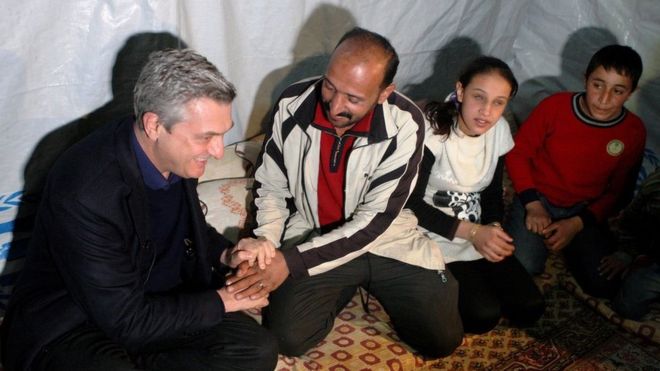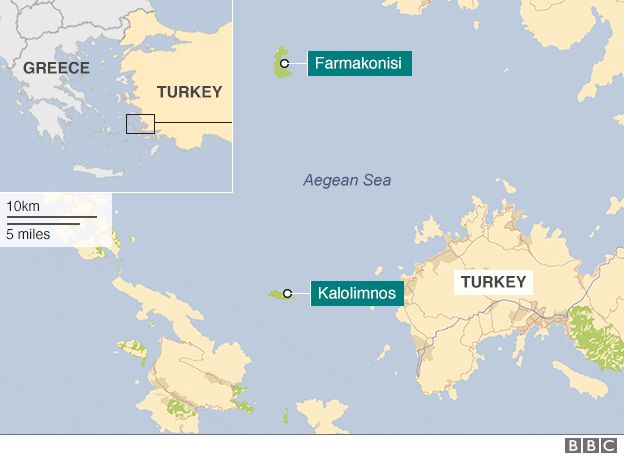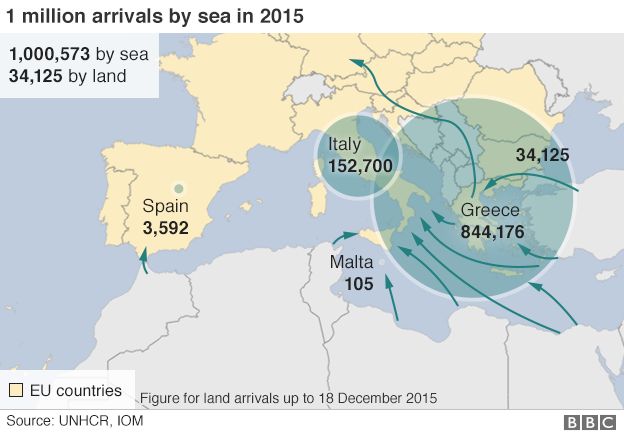
EU states could take more genuine
refugees from Syria if they worked together better, the new head of the
UN refugee agency has told the BBC.
Italian diplomat Filippo
Grandi, who took over the post from Portugal's Antonio Guterres this
year, was speaking on a visit to Lebanon.Mr Grandi also urged the EU to do more for Syrian refugees outside Europe.
EU leaders have warned of a crisis after more than a million migrants entered illegally last year.
French Prime Minister Manuel Valls told the BBC this week: "If Europe can't protect its own borders, it's the very idea of Europe that could be thrown into doubt."
On Friday, his Dutch counterpart, Mark Rutte, warned: "When spring comes and the numbers quadruple, we cannot as the EU cope with the numbers any longer."
The new UN High Commissioner for Refugees has been meeting refugees in camps in Lebanon and Jordan.
Speaking to the BBC's Quentin Somerville, Mr Grandi said: "Europe can absorb more genuine refugees if it would be better organised among the different member-states.
"However, we understand the predicament. It is a social and political predicament which is very serious."
The EU is drawing up plans to share the "burden" of refugees more evenly among member states, scrapping a controversial rule that means they must claim asylum in the first country they arrive in.
Hungary, one of the most vocal critics of migration policy, has dismissed the crisis as a "German problem" since Germany is where those arriving in the EU "would like to go".
Mr Grandi also urged the EU to "do more for the countries of first asylum" so there would be "less motivation for people to flee further away".
Katya Adler: Germans struggle to cope with influx
Teaching migrants how to behave
Migrants feel chill of tighter borders
Europe's migrant crisis

Where Europe is failing on migrants
- The 28 member states have not agreed on an EU-wide mechanism for relocating migrants, meant to ease the burden on Greece and Italy. Only small groups have been relocated so far - and several states in Central and Eastern Europe refuse to accept migrants
- The Schengen agreement on freedom of movement is in jeopardy - Hungary fenced off its borders with Serbia, Croatia and Slovenia; some other Schengen countries have re-imposed border controls: Germany, Austria, Denmark, Sweden, France and Belgium
- The Dublin regulation is not working effectively. Countries are no longer sending back migrants to their first point of entry to the EU
- Thousands of migrants - many of them Syrian war refugees - still arrive daily from Turkey
- Processing of asylum applications is slow and there is a big backlog - so reception centres are overcrowded
- Germany - the main destination for migrants - is rethinking its open-door policy, partly because of outrage over assaults on women in Cologne at New Year
BBC
YEMI



0 comments:
Post a Comment